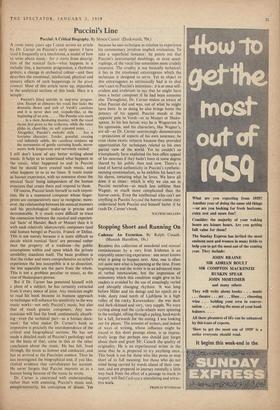Puccini's Line
Puccini: A Critical Biography. By Mosco CarnetŌĆó. (Duckworth, 70s.)
A GOOD many years ago I came across an article by Dr. Carner on Puccini's early operas. I have used it frequently as a touchstone, a model of how to write about music : for it starts from descrip- tion of the musical factsŌĆöwhat happens in a melodic line, a harmonic progression, a rhythmic gesture, a change in orchestral colourŌĆöand then describes the emotional, intellectual, physical and sensory effects of such happenings in the given context. Most of this article turns up, expanded, in the analytical sections of this book. Here is a sample : Puccini's [line] unfolds in step-wise progres- sion. Except at climaxes his vocal line lacks the dramatic thrust and stab of Verdi's cantilena and it is never shot out, torpedo-like, at the beginning of an aria. . . . The Puccini aria starts . . . in a slow,.hcsitating manner, with the vocal theme first given to the orchestra, while the voice glides in, chant-like, on soft repeated notes. . . . Altogether, Puccini's melodic style . . . has a feminine character. Tender, graceful, coaxing and infinitely subtle, his cantilena conjures up the movements of gently caressing hands, move- ments both languorous and nervously excited.
I still don't know of any better writing about music. It helps us to understand what happens in the music, what happened to and in Puccini that he should have created such music, and what happens to us as we listen. It treats music as human experience, with no nonsense about the musical 'facts' being independent of the human creatures that create them and respond to them.
Of course, Puccini lends himself to such exposi- tion. He is a mannered composer whose finger- prints are comparatively easy to recognise; more- over, the relationship between his musical manners and his psychological make-up is precise and demonstrable. It is much more difficult to trace the connection between the musical and experien- tial 'facts' of Handel, Bach or Mozart than it is with such relatively idiosyncratic composers (and odd human beings) as Puccini, Franck or Delius. This is not merely because it is more difficult to decide which musical 'facts' are personal rather than the property of a traditionŌĆöthe public assumptions within and upon which the private sensibility manifests itself. The basic problem is that the richer and more comprehensive an artist's experience the less susceptible is it to dissection, the less separable are the parts from the whole. This is not a problem peculiar to music, as the case of Shakespeare proves.
But if Dr. Carner has presented himself with a plum of a subject, he has certainly extracted from it every ounce of juice. Any musician ought to read his book because its humane approach to technique will enhance his sensitivity to the way music worksŌĆönot only Puccini's music, but also that of much greater composers. Any non- musician will find the book continuously absorb- ingŌĆöeven the technical partŌĆöas a human docu- ment : for what makes Dr. Carner's book so impressive is precisely the interdependence of the critical and biographical sections. He has not made a detailed study of Puccini's pathology and, on the basis of that, come to this or the other conclusion about the music. He has felt, lived through, the music as listener and conductor, and has so arrived at the Puccinian essence. Then he has investigated the biographical and, if you like, clinical evidence that corroborates his account. He never forgets that Puccini interests us as a human being because of the music he wrote.
Dr. Carner is concerned with understanding, rather than with assessing, Puccini's music and, complementarily, his conception of drama. Yet
because he sees technique in relation to experience his commentary involves implicit evaluation. To take a superficial instance : he points out that Puccini's instrumental' doublings, or even quad- ruplings, of the vocal line sometimes seem crudely excessive. The crudity is not basically technical; it lies in the emotional extravagance which the technique is designed to serve. Yet to object to this extravagance as intrinsically bad is to shut one's ears to Puccini's intentions : it is at once self- evident and irrelevant to say that he might have been a better composer if he had been someone else. Throughout, Dr. Carner makes us aware of what Puccini didŌĆó and was, not of what he might have been. In so doing he also brings home the potency of his appeal. Puccini stands at the opposite pole to VerdiŌĆöor to Mozart or Shake- speare. In his less heroic way he is Wagnerian in his egomania, and his characters, like Wagner's, are allŌĆöas Dr. Carner convincingly demonstrates ŌĆöprojections of aspects of his own neuroses; he even chose exotic subjects because they provided opportunities for techniques related to his own partial view of the world. Yet he couldn't so triumphantly have exploited the box-office appeal of his neuroses if they hadn't been in some degree shared by his public then and now. There's a kind of horrid authenticity in Puccini's synthetic- seeming emotionalism, as he exhibits his heart on his sleeve, torturing what he loves. We have all done it at times : which is why we can see in Puccini ourselvesŌĆöso much less sublime than Wagner, so much more complicated than the horror-comic. Even the intellectual who can't see anything in Puccini beyond the horror-comic may understand both Puccini and himself better if he reads Dr. Carner's book.
W ILFRID MELLERS










































 Previous page
Previous page